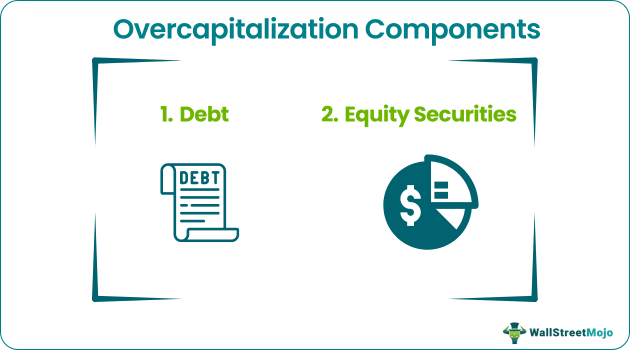Table Of Contents
What is Overcapitalization?
Overcapitalization is when a firm has raised capital over a particular limit, which is inherently unhealthy for the company. As a result, its market value is less than its capitalized worth. In this case, the company ends up paying more interest and dividends, which is impossible to sustain in the long term. It simply signifies that the company is not using the fund efficiently and has poor capital management.

We note from the above overcapitalization example of Boeing wherein its annual debt to equity ratio significantly jumped to 40.39x in 2018-2019.
Key Takeaways
- Overcapitalization is when a corporation raises capital above a certain threshold, which is intrinsically bad for the business. I
- Its market value is, therefore, lower than its capitalized value. In this situation, the business must pay out more in dividends and interest, which it cannot afford to do in the long run.
- It simply means that the corporation is not managing its capital well and is not employing the funds effectively.
Components of Overcapitalization

- Debt: The company issues debt capital to raise money and fund capital expenditure, but when a company raises debt capital over what is required, it does not meet its target capital structure and makes inefficient use of the raised funds.
- Equity Securities: The company raises money in the form of equity from capital markets through IPO or FPO, which results in too much capital in the company's hands. The company, in this case, has excess cash on its balance sheet and the opportunity cost of its funds is high. In this case, the company reports lower earnings than expected, and the shareholders lose trust in the company's management.
Overcapitalization Examples
XYZ company is engaged in the construction business in the Middle East and earns a sum of $80,000 with a required rate of return, of 20%.
This implies that their fairly capitalized capital will be $80,000 / 20% = $400,000.
Now if we assume that instead of $400,000, XYZ company is using $500,000 as its capital, then their rate of earnings will be $80,000 / $500,000 = 16%.
Thus, their rate of return reduces from 20% to 16% due to overcapitalization.
Advantages
- The company has excess capital or cash on the balance sheet, which they can put in the bank and earn a nominal rate of return, strengthening their liquidity position.
- It results in a higher valuation of the company, which means that the company, in case of an acquisition or a merger, can get a higher price for itself as it can take excess capital and cash on its balance sheet.
- Overcapitalization can fuel and fund the Capex plans of the company.
Disadvantages
- The rate of return on capital goes down as the company raises more and more capital from the market, making the company's capital structure look bad and inadequate.
- The shareholder's confidence in the company gets lost because of the underutilization of funds, resulting in a fall in the share price.
- It creates problems with re-organization.
- It leads to the underutilization of available resources.
- It also leads to a higher rate of taxation on the company's income statement.
- The company cannot easily market its shares. Thus, it can lead to malpractices, often associated with manipulating its earnings period or the earnings amount.
- It also leads to a superior valuation of assets than its real value or intrinsic value.
Conclusion
A company is over-capitalized when its earnings are insufficient to justify a fair return on the amount of capital raised through equity and debentures. Hence, both overcapitalization and undercapitalization are not accepted in any of the economic principles or the smoothing functioning of the company as it affects the company's financial stability and revenue leakage. Therefore, a good analyst should look at the company's financial statements of compressive income to determine the capital structure of the company and should also make a peer comparison of the optimal capital structure prevailing in the industry before deciding to make an investment decision.

